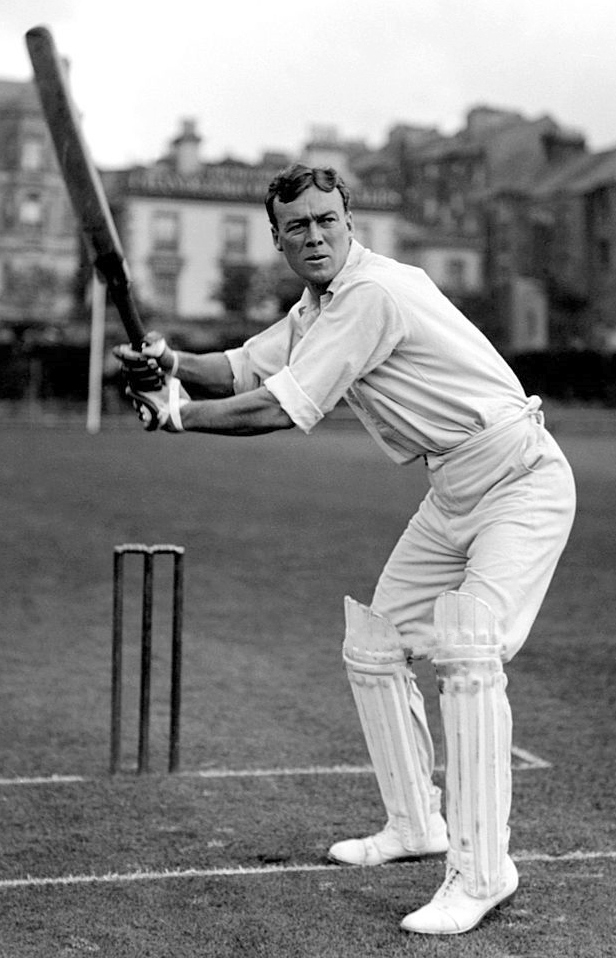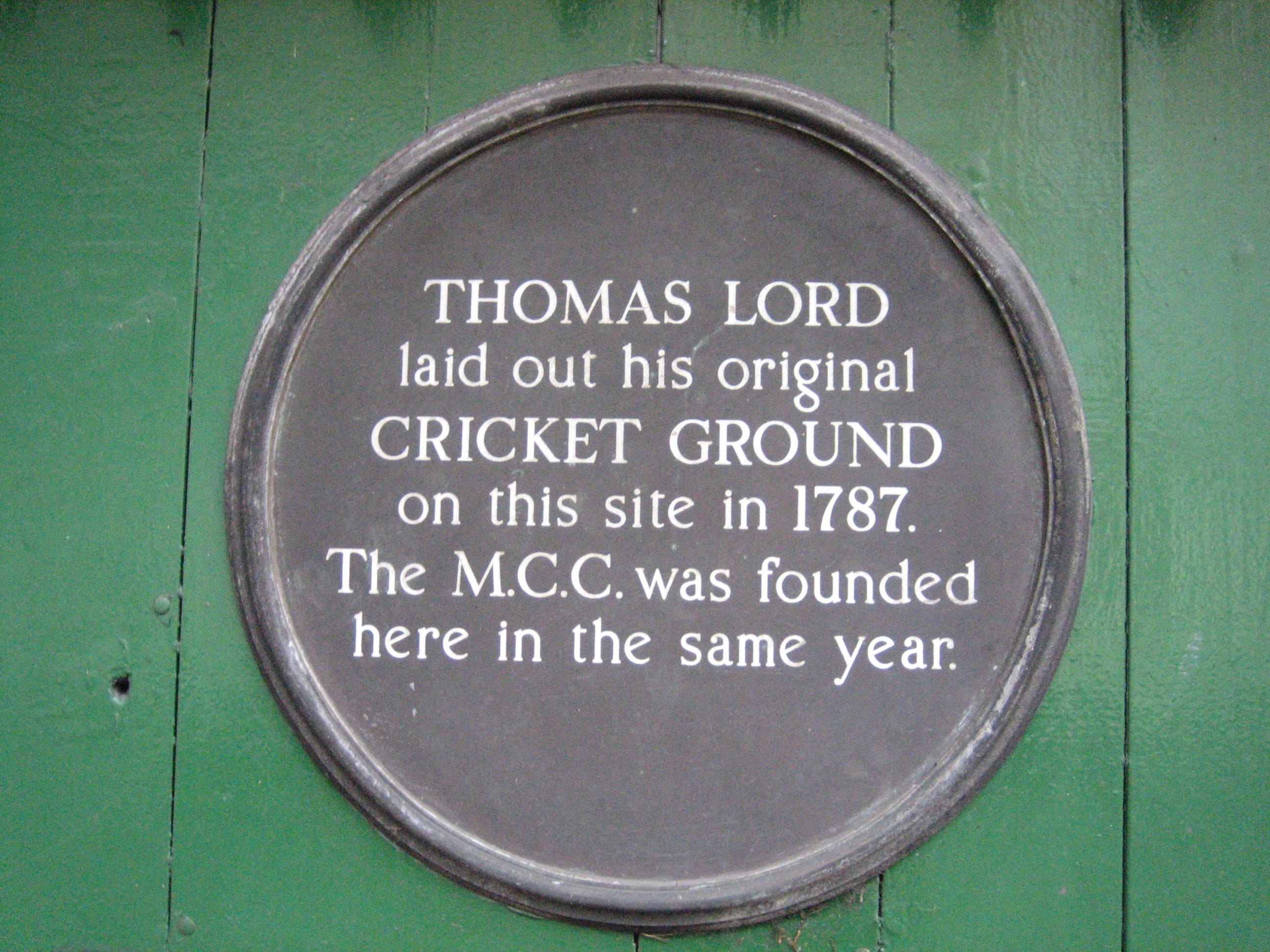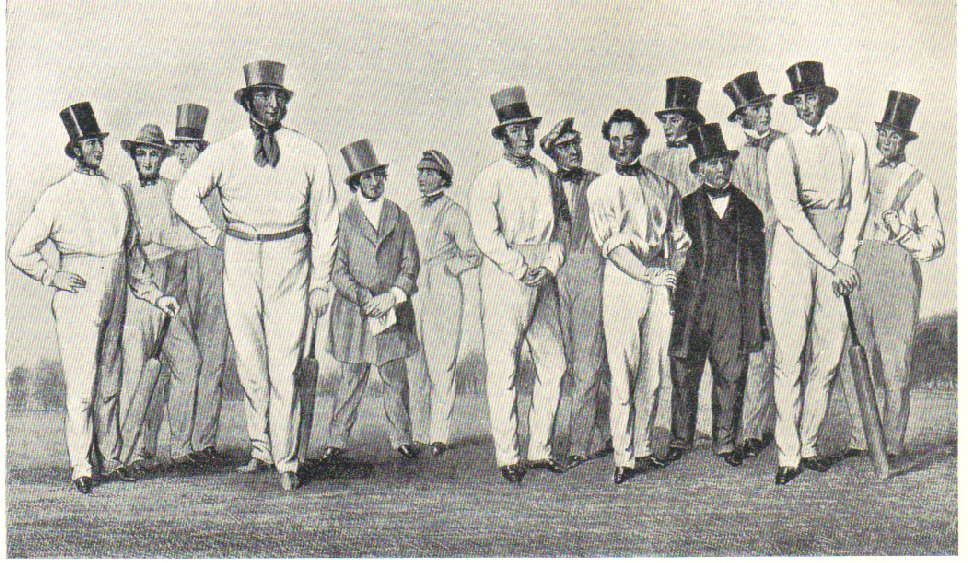|
South African Cricket Team In England In 1894
The inaugural South African cricket tour of England took place in the 1894 season. None of the 24 matches have first-class standing, although South Africa had already begun playing matches subsequently recognised as Test matches at home and many of the matches on tour were against first-class county clubs. The South Africans won 12 matches, drew 7 and lost 5. The team * H. H. Castens (captain) *Godfrey Cripps * Darnton Davey * George Glover *Ernest Halliwell *Frank Hearne *Clement Johnson * George Kempis *Bonnor Middleton * Charles Mills * Dante Parkin *Thomas Routledge * George Rowe * Arthur Seccull * Cyril Sewell The manager was W. A. Simkins of Cape Town. Most of the leading players were available, except for Bernard Tancred and Alfred Richards, whose work prevented their participation. After the team was selected, Charles Mills replaced Voltelin van der Bijl. The best-known player on the team was Frank Hearne, one of the few players to represent two countries in Test ... [...More Info...] [...Related Items...] OR: [Wikipedia] [Google] [Baidu] |
South Africa National Cricket Team
The South Africa national cricket team, also known as the Proteas, represents South Africa in men's international cricket and is administered by Cricket South Africa (CSA). South Africa is a full member of the International Cricket Council (ICC), with Test, One-Day International (ODI) and Twenty20 International (T20I) status. Its nickname derives from South Africa's national flower, ''Protea cynaroides'', commonly known as the "King Protea". South Africa entered first-class and international cricket at the same time when they hosted an England cricket team in the 1888–89 season. Initially, the team was no match for Australia or England but, having gained experience and expertise, they were able to field a competitive team by the first decade of the 20th century. The team regularly played against Australia, England and New Zealand through to the 1960s, by which time there was considerable opposition to the country's apartheid policy. The ICC imposed an international ban on ... [...More Info...] [...Related Items...] OR: [Wikipedia] [Google] [Baidu] |
George Rowe (cricketer)
George Alexander Rowe (15 June 1874 – 8 January 1950) was a South African cricketer. One of the earliest successful South African Bowler (cricket), bowlers, George Rowe was born in Grahamstown, Cape Colony, on 15 June 1874. Playing for Western Province cricket team (South Africa), Western Province during the early years of the SuperSport Series, Currie Cup, he made his first-class cricket, first class debut against Natal cricket team, Natal in 1893/94 in the final of the competition, and played his last match for the province in 1907. He was a left-arm orthodox spin, slow left-arm orthodox bowler and claimed five wickets in an innings on thirteen occasions, converting five of them into ten-wicket match hauls. He first made his mark on South African cricket team in England in 1894, South Africa's non-first-class tour of England in 1894 where he was the pick of the bowlers in a wet summer, taking 136 wickets at 12.87 apiece. When Lord Hawke brought Marylebone Cricket Club, E ... [...More Info...] [...Related Items...] OR: [Wikipedia] [Google] [Baidu] |
1894 In South African Cricket
Events January–March * January 4 – A military alliance is established between the French Third Republic and the Russian Empire. * January 7 – William Kennedy Dickson receives a patent for motion picture film in the United States. * January 9 – New England Telephone and Telegraph installs the first battery-operated telephone switchboard, in Lexington, Massachusetts. * February 12 ** French anarchist Émile Henry sets off a bomb in a Paris café, killing one person and wounding twenty. ** The barque ''Elisabeth Rickmers'' of Bremerhaven is wrecked at Haurvig, Denmark, but all crew and passengers are saved. * February 15 ** In Korea, peasant unrest erupts in the Donghak Peasant Revolution, a massive revolt of followers of the Donghak movement. Both China and Japan send military forces, claiming to come to the ruling Joseon dynasty government's aid. ** At 04:51 GMT, French anarchist Martial Bourdin dies of an accidental detonation of his own bomb, ... [...More Info...] [...Related Items...] OR: [Wikipedia] [Google] [Baidu] |
1894 In English Cricket
Events January–March * January 4 – A military alliance is established between the French Third Republic and the Russian Empire. * January 7 – William Kennedy Dickson receives a patent for motion picture film in the United States. * January 9 – New England Telephone and Telegraph installs the first battery-operated telephone switchboard, in Lexington, Massachusetts. * February 12 ** French anarchist Émile Henry sets off a bomb in a Paris café, killing one person and wounding twenty. ** The barque ''Elisabeth Rickmers'' of Bremerhaven is wrecked at Haurvig, Denmark, but all crew and passengers are saved. * February 15 ** In Korea, peasant unrest erupts in the Donghak Peasant Revolution, a massive revolt of followers of the Donghak movement. Both China and Japan send military forces, claiming to come to the ruling Joseon dynasty government's aid. ** At 04:51 GMT, French anarchist Martial Bourdin dies of an accidental detonation of his own bomb, next ... [...More Info...] [...Related Items...] OR: [Wikipedia] [Google] [Baidu] |
Roy Webber
Roy Webber (died 14 November 1962 aged 48) was a British cricket scorer and statistician. After World War II, in which he served with the Royal Air Force, he decided to turn what had been his hobby into his profession. He had the necessary proficiency with figures, having previously been an accountant. He was the scorer for BBC Television's Test coverage for many years. He edited ''The Cricket Annual'' in 1961 and 1962. He was joint editor of the magazine ''Playfair Cricket Monthly'' and wrote a number of cricket books. He also wrote for the ''News Chronicle'' and the ''Daily Mail''. He married twice. His first was c. 1940 to Margaret Winiefred Bentley. They had two children: Patience Margaret (1942) and Nigel Emary Roy (1943). They divorced c. 1946. Second marriage was c. 1952 was to Daphne Goodacre, with whom he had no children. He died of a heart attack, and was buried at Golders Green Crematorium. Bibliography He wrote the following books (as well as contributing statist ... [...More Info...] [...Related Items...] OR: [Wikipedia] [Google] [Baidu] |
Gloucestershire County Cricket Club
Gloucestershire County Cricket Club is one of eighteen first-class county clubs within the domestic cricket structure of England and Wales. It represents the historic county of Gloucestershire. Founded in 1870, Gloucestershire have always been first-class and have played in every top-level domestic cricket competition in England. The club played its first senior match in 1870 and W. G. Grace was their captain. The club plays home games at the Bristol County Ground in the Bishopston area of north Bristol. A number of games are also played at the Cheltenham Cricket Festival at the College Ground, Cheltenham and matches have also been played at the Gloucester cricket festival at The King's School, Gloucester. Gloucestershire's most famous players have been W. G. Grace, whose father founded the club, and Wally Hammond, who scored 113 centuries for them. The club has had two notable periods of success: in the 1870s when it was unofficially acclaimed as the Champion County on a ... [...More Info...] [...Related Items...] OR: [Wikipedia] [Google] [Baidu] |
Lord's
Lord's Cricket Ground, commonly known as Lord's, is a cricket venue in St John's Wood, London. Named after its founder, Thomas Lord, it is owned by Marylebone Cricket Club (MCC) and is the home of Middlesex County Cricket Club, the England and Wales Cricket Board (ECB), the European Cricket Council (ECC) and, until August 2005, the International Cricket Council (ICC). Lord's is widely referred to as the ''Home of Cricket'' and is home to the world's oldest sporting museum. Lord's today is not on its original site; it is the third of three grounds that Lord established between 1787 and 1814. His first ground, now referred to as Lord's Old Ground, was where Dorset Square now stands. His second ground, Lord's Middle Ground, was used from 1811 to 1813 before being abandoned to make way for the construction through its outfield of the Regent's Canal. The present Lord's ground is about north-west of the site of the Middle Ground. The ground can hold 31,100 spectators, the capacity ... [...More Info...] [...Related Items...] OR: [Wikipedia] [Google] [Baidu] |
Marylebone Cricket Club
Marylebone Cricket Club (MCC) is a cricket club founded in 1787 and based since 1814 at Lord's Cricket Ground, which it owns, in St John's Wood, London. The club was formerly the governing body of cricket retaining considerable global influence. In 1788, the MCC took responsibility for the laws of cricket, issuing a revised version that year. Changes to these Laws are now determined by the International Cricket Council (ICC), but the copyright is still owned by MCC. When the ICC was established in 1909, it was administered by the secretary of the MCC, and the president of MCC automatically assumed the chairmanship of ICC until 1989. For much of the 20th century, commencing with the 1903–04 tour of Australia and ending with the 1976–77 tour of India, MCC organised international tours on behalf of the England cricket team for playing Test matches. On these tours, the England team played under the auspices of MCC in non-international matches. In 1993, its administrative an ... [...More Info...] [...Related Items...] OR: [Wikipedia] [Google] [Baidu] |
England National Cricket Team
The England cricket team represents England and Wales in international cricket. Since 1997, it has been governed by the England and Wales Cricket Board (ECB), having been previously governed by Marylebone Cricket Club (the MCC) since 1903. England, as a founding nation, is a Full Member of the International Cricket Council (ICC) with Test, One Day International (ODI) and Twenty20 International (T20I) status. Until the 1990s, Scottish and Irish players also played for England as those countries were not yet ICC members in their own right. England and Australia were the first teams to play a Test match (15–19 March 1877), and along with South Africa, these nations formed the Imperial Cricket Conference (the predecessor to today's International Cricket Council) on 15 June 1909. England and Australia also played the first ODI on 5 January 1971. England's first T20I was played on 13 June 2005, once more against Australia. , England have played 1,058 Test matches, winning 387 and lo ... [...More Info...] [...Related Items...] OR: [Wikipedia] [Google] [Baidu] |
Voltelin Van Der Bijl
Voltelin Albert William van der Bijl (31 January 1872 – 2 October 1941) was a South African cricketer who played for Western Province in the 1890s. Voltelin van der Bijl was an all-rounder who batted in the middle order and opened the bowling. He took 6 for 56 and 3 for 36 in Western Province's victory over Griqualand West in 1890–91. In the 1892–93 season he made his highest first-class score of 61 and took three wickets when Western Province beat Transvaal in Western Province's first appearance in the Currie Cup. He was selected to tour England in South Africa's first overseas tour in 1894 but was unavailable and was replaced by Charles Mills. ''Cricket'', 13 September 1894, pp. 388–89. His nephew [...More Info...] [...Related Items...] OR: [Wikipedia] [Google] [Baidu] |
Alfred Richards (sportsman)
Alfred Renfrew Richards (14 December 1867 – 9 January 1904) was a South African sportsman who represented his country at Test cricket and rugby union. Born in Grahamstown, Cape Colony, and educated at The Leys School in Cambridge, Richards was capped three times for South Africa in rugby, including captaining them once, and made one Test cricket appearance, also as captain. Cricket career Richards played for Western Province in some of the earliest provincial matches in South Africa, and in 1893–94, his 108 was the highest score as his team beat Natal to win the Currie Cup. His next first-class match came when he captained Western Province against the touring Lord Hawke's XI in 1895–96, when his 58, scored out of a total of 122, won him selection for the third Test match of the series, which followed a few days later. Richards captained the Test side, but scored only 6 and 0 as South Africa lost by an innings and 33 runs. He never played first-class cricket again. Rugb ... [...More Info...] [...Related Items...] OR: [Wikipedia] [Google] [Baidu] |
Bernard Tancred
Augustus Bernard Tancred (20 August 1865 – 23 November 1911) was a 19th-century South African Test cricketer. His brothers, Vincent and Louis, also played Test cricket for South Africa. Early life Born in Port Elizabeth, South Africa, Tancred attended St. Aidan's College, Grahamstown, where he first displayed his cricketing prowess. His contemporaries at school included Percy Fitzpatrick and Charles Coghlan. He attended the Cape University and although there are no records to indicate that he graduated he practised law throughout South Africa, including Kimberley, Pretoria and Johannesburg. He became a prominent member of the Uitlander community. Tancred continued to star in club cricket, gaining a reputation as the best batsman in South Africa, with a strong defence, as well as an outstanding point fielder. Career Tancred was an obvious choice for the first South African cricket side, assembled to play the first touring English cricket team during its two Test tour of ... [...More Info...] [...Related Items...] OR: [Wikipedia] [Google] [Baidu] |






